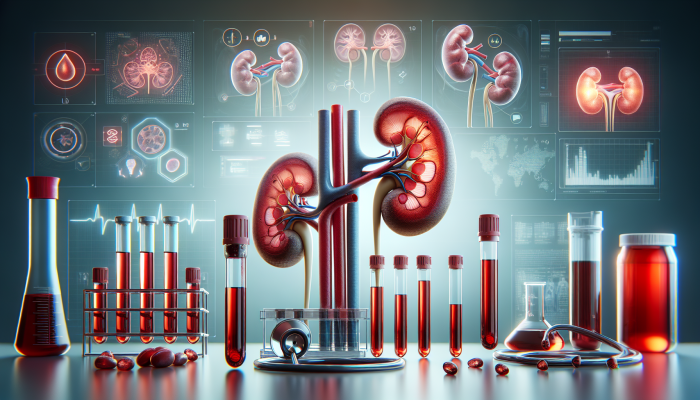Comprehensive Insights into Kidney Function and Its Impact on Health
Unveiling the Essential Functions of Kidneys for Enhanced Wellbeing

The kidneys are indispensable organs that significantly contribute to the overall health and functionality of the human body. They undertake the vital task of filtering out waste products and excess fluids from the bloodstream, thereby ensuring that all bodily systems operate with optimal efficiency. This intricate filtration process is crucial for regulating electrolyte levels, controlling blood pressure, and maintaining the body's delicate acid-base balance. Essentially, the kidneys act as sophisticated processors, meticulously evaluating blood to eliminate harmful toxins while simultaneously conserving necessary elements. Furthermore, when functioning at their best, the kidneys produce hormones that are critical for red blood cell production and the upkeep of bone health. Understanding these fundamental roles highlights the importance of regular kidney health assessments, such as a kidney blood test in Whitehaven, to keep track of kidney performance and identify any potential health issues at an early stage.
The Importance of Regular Kidney Function Testing for Preventive Health
Conducting regular tests on kidney function is absolutely vital for the early detection of potential health concerns. Many kidney disorders develop gradually, often presenting no noticeable symptoms until they reach advanced stages. Routine assessments, including the kidney blood test in Whitehaven, enable healthcare professionals to monitor significant indicators such as creatinine levels and the glomerular filtration rate (GFR). By recognising abnormalities at an early stage, timely intervention becomes possible, which can significantly improve health outcomes and prevent serious complications down the line. Moreover, individuals with risk factors such as diabetes, hypertension, or a family history of kidney disease should prioritise regular evaluations to protect their health. Embracing these proactive measures can lead to lifestyle modifications or medical treatments that enhance kidney health and overall functionality.
Identifying and Understanding Common Kidney Disorders and Their Implications
A variety of conditions can adversely impact kidney health, with chronic kidney disease (CKD) and kidney stones being among the most prevalent. CKD is a progressive condition characterised by a gradual decrease in kidney function, often triggered by factors such as diabetes or high blood pressure. If left untreated, CKD can advance to end-stage renal disease, necessitating dialysis or kidney transplantation to sustain life. Conversely, kidney stones are composed of crystallised minerals that accumulate within the kidneys, leading to severe pain and urinary complications. Given the often asymptomatic nature of these conditions, regular kidney function tests—such as the kidney blood test in Whitehaven—are imperative for detecting these issues before they escalate, thereby facilitating effective management strategies and improving patient outcomes.
Exploring the Different Types of Kidney Blood Tests Available

Understanding the Significance of the Serum Creatinine Test in Kidney Assessment
The serum creatinine test is a pivotal tool for assessing kidney functionality. This test measures the concentration of creatinine in the bloodstream, which is a waste product generated during muscle metabolism. Healthy kidneys effectively filter out creatinine; therefore, elevated serum creatinine levels can indicate compromised kidney function. For patients undergoing a kidney blood test in Whitehaven, an increase in creatinine levels often necessitates further evaluation, especially if it is accompanied by other abnormal findings. The test is relatively straightforward and typically requires only a small blood sample collected from the arm. By routinely monitoring creatinine levels, healthcare professionals can accurately assess the kidneys' filtering capacity and make informed decisions regarding patient care and necessary interventions.
Evaluating the Blood Urea Nitrogen (BUN) Test for Comprehensive Kidney Health Analysis
The Blood Urea Nitrogen (BUN) test plays a crucial role in evaluating the level of urea nitrogen present in the bloodstream, providing additional insights into kidney function and hydration levels. Urea nitrogen is a waste product produced from protein metabolism, which the kidneys are responsible for excreting. Elevated BUN levels may indicate kidney dysfunction or dehydration, while lower levels might suggest a hepatic issue or malnutrition. Incorporating the BUN test into a kidney blood test in Whitehaven yields a more comprehensive understanding of an individual’s renal health. This test is particularly valuable in assessing patients with conditions that may impact kidney functionality, enabling timely diagnosis and necessary treatment adjustments to promote optimal kidney health and prevent further complications.
Deciphering the Importance of the Glomerular Filtration Rate (GFR) Test in Kidney Function Assessment

The Glomerular Filtration Rate (GFR) test is instrumental in estimating the efficiency with which the kidneys filter waste products from the blood. This assessment is crucial for diagnosing kidney disease and determining its stage. A GFR value of 90 mL/min or higher is generally considered normal, whereas lower values may indicate varying degrees of kidney impairment. The GFR can be calculated using serum creatinine levels along with additional factors such as age, sex, and race, making it a highly sophisticated assessment tool. For individuals receiving a kidney blood test in Whitehaven, understanding their GFR empowers them to take proactive steps regarding their kidney health. Regular assessments can facilitate the monitoring of changes in kidney function over time and inform treatment decisions, ultimately enhancing health outcomes.
Essential Preparatory Steps for an Accurate Kidney Blood Test
Understanding Fasting Requirements for Optimal Blood Test Outcomes
Proper preparation is paramount for obtaining accurate results from a kidney blood test. Certain tests, such as serum creatinine and BUN assessments, may necessitate fasting for several hours prior to the blood draw to ensure that food does not interfere with the test results. It is imperative to adhere to the specific instructions provided by your healthcare provider regarding the fasting duration and any permissible fluids. For individuals undergoing a kidney blood test in Whitehaven, comprehending these requirements can prevent delays or the need for repeat tests. Being well-prepared can streamline the testing process and yield more precise results, ultimately aiding in the effective management of kidney health and wellbeing.
Identifying Medications That Should Be Avoided Before Testing
Certain medications can significantly interfere with the accuracy of kidney function tests, making it essential to consult with your healthcare provider before the test. Common medications, including some antihypertensives and non-steroidal anti-inflammatory drugs (NSAIDs), may skew results and lead to misinterpretation of kidney function. Patients should provide a detailed list of all medications, supplements, and over-the-counter drugs they are currently taking during their consultation. By identifying potentially problematic substances, healthcare professionals can offer tailored advice on which medications to pause prior to undergoing a kidney blood test in Whitehaven. This proactive approach ensures that test results accurately reflect kidney health without the influence of medication, facilitating better patient outcomes.
What to Anticipate During the Kidney Blood Test Procedure
A kidney blood test is a straightforward procedure that typically involves drawing blood from a vein in the arm. Although the thought of needles may induce anxiety for some patients, the process is quick and generally results in minimal discomfort. Patients may feel a brief pinch or sting as the needle is inserted, followed by a sensation of pressure as blood is drawn. After the test, there are usually no restrictions on daily activities, allowing individuals to resume their normal routines without delay. Understanding what to expect can significantly alleviate stress and enhance the overall experience of undergoing a kidney blood test in Whitehaven. Effective communication with healthcare professionals can further improve comfort and understanding throughout the process, ensuring a positive testing experience.
Locating Kidney Testing Services in Whitehaven for Optimal Health
Exploring Local Hospitals Offering Comprehensive Kidney Function Testing Services
Whitehaven is home to several reputable hospitals that provide extensive kidney function testing services. These facilities are equipped with modern laboratories staffed by skilled professionals who are dedicated to delivering high-quality care. Patients can conveniently access kidney blood tests through outpatient services or as part of hospital care. The hospitals in Whitehaven are also well-connected to specialist kidney clinics, ensuring a seamless transition to further evaluation or treatment if necessary. For individuals prioritising their health, obtaining a kidney blood test in Whitehaven at local hospitals offers reliability and professionalism while remaining within the community, making it a convenient choice for many residents.
Private Clinics Offering Efficient Kidney Blood Testing Services for Quick Access
For those seeking quicker or more convenient options, several private clinics in Whitehaven provide kidney blood testing services. These clinics often offer flexible scheduling and shorter wait times, catering to patients who prefer a more personalised experience. Many private facilities utilise cutting-edge technology and procedures to ensure accurate testing results. They tend to adopt a streamlined approach to consultations, allowing for efficient follow-ups to discuss results and recommend any necessary lifestyle changes or treatments. Choosing to undergo a kidney blood test in Whitehaven at a private clinic can be an appealing choice for those desiring efficiency and discretion in their healthcare journey, ultimately facilitating better health management.
Accessing Kidney Tests Through General Practitioner Surgeries for Convenient Care
Numerous general practitioner (GP) surgeries in Whitehaven are equipped to arrange kidney blood tests for their patients. This accessibility ensures that individuals do not need to travel far for testing, allowing for continuity of care, as results can be discussed directly with their personal GP. Many surgeries can perform initial assessments and can refer patients to specialists if further investigation is warranted. By facilitating convenient access to testing, GP surgeries play a crucial role in promoting kidney health within the community. For anyone needing a kidney blood test in Whitehaven, visiting their GP is often the first step towards maintaining optimal kidney function and overall health, ensuring that patients receive appropriate monitoring and support.
Interpreting Kidney Test Results for Improved Health Management
Understanding Normal Ranges for Kidney Function Tests for Accurate Interpretation
Grasping the normal ranges for kidney function tests is critical for accurately interpreting your results. For serum creatinine, normal values typically range between 60 to 110 micromoles per litre, while BUN levels generally fall between 2.5 to 7.1 millimoles per litre. GFR values above 90 mL/min are considered normal, indicating effective kidney filtration. However, these ranges may vary based on factors such as age, gender, and muscle mass. Knowing what constitutes normal can empower individuals to better assess their kidney health following a kidney blood test in Whitehaven. This knowledge encourages patients to engage in informed discussions with their healthcare providers about any concerns or anomalies found in their test results, fostering a collaborative approach to health management and proactive care.
Assessing Abnormal Results from Kidney Function Tests for Informed Health Decisions
Receiving abnormal results from kidney function tests can understandably provoke concern and anxiety. Elevated levels of creatinine or BUN, or a reduced GFR, may indicate issues such as kidney damage or decreased function. In such cases, further testing may be necessary to identify the underlying cause of the abnormalities. It's important to remember that a single abnormal result does not automatically indicate a serious condition; it may be influenced by factors like hydration status or recent physical activity. Following up with a healthcare provider after a kidney blood test in Whitehaven is essential for determining the next steps, which may include additional tests, lifestyle changes, or referrals to specialists for comprehensive evaluation and management, ensuring patients receive appropriate care and intervention.
Engaging in Meaningful Conversations About Your Kidney Test Results with Healthcare Professionals
Consulting with a healthcare professional to discuss kidney function test results is imperative for understanding one’s health status. A qualified practitioner can interpret the numbers in the context of an individual’s overall health, medical history, and presenting symptoms. This dialogue can clarify any concerns regarding kidney function and outline appropriate action steps if necessary. Regular discussions with doctors can also foster a proactive approach to kidney health, encouraging patients to take preventive measures and make informed decisions regarding their lifestyle and care. Engaging in these conversations after a kidney blood test in Whitehaven promotes a collaborative partnership in managing kidney health effectively, ensuring patients feel supported and informed in their health journey.
Monitoring Changes in Kidney Function Over Time for Enhanced Health Outcomes
Tracking fluctuations in kidney function test results over time is an essential practice for individuals concerned about their kidney health. Regular testing can reveal trends that indicate the progression of kidney disease or the effectiveness of interventions. For patients with risk factors such as hypertension or diabetes, routine monitoring can help identify early signs of decline, prompting timely interventions to slow progression. Collaborating with healthcare providers to interpret these trends allows for tailored management plans that reflect evolving health needs. Maintaining a proactive stance after a kidney blood test in Whitehaven enhances overall kidney health outcomes and ensures patients remain informed about their condition and health trajectory, fostering a long-term commitment to their wellbeing.
Understanding the Impact of Lifestyle and Dietary Choices on Kidney Health
Lifestyle choices and dietary habits significantly influence kidney health and can be reflected in blood test outcomes. For instance, excessive consumption of salt, sugar, and processed foods can elevate blood pressure and contribute to kidney damage over time. In contrast, a balanced diet rich in fruits, vegetables, whole grains, and adequate hydration supports optimal kidney function. Regular physical activity is also crucial, as it aids in maintaining a healthy weight and managing chronic conditions that impact kidney health. Individuals are encouraged to adopt healthier lifestyle choices and routinely assess their kidney function through testing, such as the kidney blood test in Whitehaven, to monitor these vital indicators and make necessary adjustments to their habits for improved health outcomes and enhanced quality of life.
Implementing Effective Follow-Up Strategies for Optimal Kidney Health Management
The Necessity of Regular Kidney Function Monitoring for At-Risk Individuals
For individuals at risk of kidney disease, regular monitoring of kidney function is essential. This proactive approach, which may involve routine kidney blood tests in Whitehaven, can help detect early signs of kidney impairment and enable timely intervention. Those with chronic conditions such as diabetes or hypertension should particularly prioritise these assessments, as their health conditions can significantly impact kidney function. Consistent follow-ups allow healthcare providers to track any changes in kidney health and adjust treatment plans as necessary, ultimately safeguarding long-term kidney function and overall wellbeing, while providing peace of mind to patients regarding their health status.
Implementing Lifestyle Changes for Enhanced Kidney Health and Wellbeing
Adopting lifestyle changes can substantially enhance kidney health and potentially reverse certain kidney issues. Implementing a balanced diet that restricts sodium, phosphorus, and protein intake can alleviate the workload on the kidneys, allowing them to function more effectively. Regular physical activity is equally essential, as it aids in maintaining a healthy weight and managing blood pressure. Quitting smoking and moderating alcohol consumption are also critical steps toward improving kidney health. Individuals are encouraged to engage in discussions with healthcare professionals about creating a tailored plan to promote kidney health based on their kidney blood test in Whitehaven results. These modifications can work synergistically to optimise health outcomes and enhance overall wellbeing, ensuring a proactive approach to health management.
Exploring Medical Treatments for Effective Management of Kidney Health Challenges
In certain situations, medical interventions may be necessary to manage kidney health effectively. For individuals diagnosed with chronic kidney disease or severe abnormalities in blood test results, medications that control blood pressure, diabetes, or cholesterol may be required to mitigate further damage. Additionally, referrals to nephrologists for specialised care can assist in managing more complex cases. Patients are advised to remain vigilant about their kidney health and seek medical advice promptly if they notice any changes or symptoms of kidney issues. Regular assessments, such as the kidney blood test in Whitehaven, can facilitate timely interventions and ensure that patients maintain optimal kidney function and overall health, ultimately leading to better health outcomes.
Raising Awareness for Kidney Health in Whitehaven
Engaging Community Initiatives to Promote Kidney Health Education and Awareness
Various community programs in Whitehaven aim to enhance awareness about kidney health and encourage preventive measures. These initiatives often include workshops, free screening events, and educational sessions that provide valuable information about kidney disease, risk factors, and the importance of regular testing. Local health authorities frequently collaborate with hospitals and clinics to facilitate these programs, making them accessible to the broader community. By promoting understanding and encouraging proactive health behaviours, these initiatives strive to improve the overall health of residents and reduce the incidence of kidney-related issues, ultimately contributing to a healthier population and elevating public awareness about kidney health.
Accessing Reliable Educational Resources on Kidney Health for Informed Decision-Making
For those seeking trustworthy information regarding kidney health in Whitehaven, a plethora of educational resources are available. Local hospitals, health centres, and online platforms often provide access to current materials on kidney function, disease prevention, and management strategies. Additionally, national organisations focused on kidney health offer comprehensive resources, including brochures, websites, and helplines. Engaging with these materials can empower individuals to make informed choices regarding their kidney health and understand the significance of regular assessments, such as the kidney blood test in Whitehaven, ultimately promoting improved health outcomes and fostering a proactive stance on health management.
Connecting with Support Groups for Effective Management of Kidney Conditions
Support groups for individuals with kidney conditions are available in Whitehaven, offering essential emotional and practical support to those affected. These groups provide a safe space for individuals to share their experiences, ask questions, and receive guidance from peers and healthcare professionals. Being part of a support network can significantly aid individuals in coping with the challenges of managing kidney disease, fostering a sense of community and shared understanding. Access to these groups can be transformative, offering education on living with kidney disease and the importance of regular monitoring through tests like the kidney blood test in Whitehaven, ensuring that individuals feel supported in their health journey and empowered to manage their conditions effectively.
Participating in Health Screening Events for Early Detection of Kidney Issues
Regular health screening events focused on the early detection of kidney disease are conducted in Whitehaven, underscoring the community's commitment to promoting kidney health. These events often include free or low-cost kidney function tests, educational seminars, and opportunities for individuals to engage with healthcare professionals. By participating in these events, residents can gain insights into their kidney health status, learn about preventive measures, and receive guidance on lifestyle changes that support kidney function. Such initiatives reinforce the importance of early detection and intervention, encouraging individuals to take control of their kidney health and wellbeing, ultimately fostering a healthier community.
Navigating Costs and Insurance Coverage for Kidney Testing Services
Utilising NHS Services for Accessible and Affordable Kidney Blood Testing
In Whitehaven, kidney blood tests are typically covered under NHS services, making them accessible to residents seeking to monitor their kidney health. The NHS provides comprehensive healthcare, including essential screenings and tests, ensuring that individuals can obtain necessary assessments without the financial burden of high costs. For those eligible for NHS care, accessing a kidney blood test in Whitehaven is a straightforward process that often involves a referral from a GP. This affordability is critical for maintaining public health, as it encourages regular testing and early intervention for kidney diseases, ultimately improving community health outcomes and promoting awareness about the importance of kidney health.
Understanding the Costs Associated with Private Kidney Testing Services
For those opting for private kidney blood testing services in Whitehaven, it is essential to understand the associated costs. Prices for private tests can vary significantly based on the clinic, specific tests conducted, and whether additional consultations are required. Typically, private kidney blood tests may range from £50 to £200, depending on the depth of the assessment and the services provided. Although private testing may appear more expensive, it can offer advantages such as reduced wait times and increased privacy. Individuals considering this option should weigh these factors against their specific needs and circumstances to make an informed decision regarding their healthcare, ensuring they choose the best path for their kidney health.
Evaluating Insurance Coverage for Kidney Testing Services for Financial Planning
When contemplating kidney blood tests, individuals should also consider their insurance coverage. Many health insurance plans cover a range of diagnostic tests, including those for kidney function, but specifics can vary widely between providers and policies. It is advisable for patients to review their insurance plan details to understand coverage limits, co-pays, and any required pre-authorisations. For those with comprehensive coverage, accessing a kidney blood test in Whitehaven may be financially manageable; however, individuals should remain informed about their responsibilities and coverage options when seeking private testing to avoid unexpected costs, ensuring they are well-prepared for their healthcare expenses.
Frequently Asked Questions About Kidney Blood Tests for Patient Knowledge
What is the primary purpose of a kidney blood test?
A kidney blood test evaluates levels of various substances in the blood, such as creatinine and urea nitrogen, to assess kidney function and overall health status, providing essential information for healthcare providers.
How often should I consider getting a kidney blood test?
The frequency of testing largely depends on individual risk factors; those at risk may require annual tests, while others might need testing every few years based on their current health status and medical history.
What do elevated creatinine levels indicate about kidney health?
High creatinine levels may suggest impaired kidney function, prompting further investigations to determine the underlying cause and necessary treatment options, ensuring prompt attention to kidney health.
Is the kidney blood test procedure painful?
The blood draw for a kidney test is typically quick and involves minimal discomfort, generally comparable to a standard blood test procedure, making it a manageable experience for most patients.
Can I eat before undergoing a kidney blood test?
Some kidney tests may require fasting; therefore, it is crucial to follow your healthcare provider's specific instructions regarding eating or drinking prior to the test to ensure accurate results.
What additional tests might be performed alongside a kidney blood test?
Additional tests may include urinalysis, imaging studies, or further blood tests to gain a comprehensive understanding of kidney health and functionality, providing a holistic view of the patient's condition.
How long does it typically take to receive kidney test results?
Results can generally take anywhere from a few hours to a few days, depending on the laboratory and the specific tests conducted, with some results available more quickly than others based on the test type.
What steps should I take if my test results are abnormal?
If your results are abnormal, it is essential to consult your healthcare provider to discuss the implications and determine the next steps for further evaluation or treatment, ensuring comprehensive care and management.
Are kidney blood tests covered by the NHS?
Yes, kidney blood tests are usually covered by the NHS, making them accessible for residents in Whitehaven to monitor their kidney health without financial strain, promoting community health and wellbeing.
What lifestyle changes can I adopt to improve kidney health effectively?
Adopting a balanced diet, ensuring adequate hydration, engaging in regular physical activity, and actively managing chronic conditions like diabetes and hypertension can significantly enhance kidney health and functionality, leading to better outcomes.
Connect with us on Facebook!
This Article Was First Found On https://bloodtest.co.uk
The Article Kidney Blood Test Insights: What Whitehaven Residents Need to Know Was Found On https://limitsofstrategy.com

